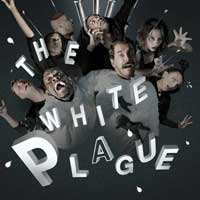
 [rating=4] A play that switches from social satire to character-driven drama could be called discordant, but that doesn’t mean it isn’t an interesting theatre experience. It’s a feature of some of the plays Bertolt Brecht wrote while he was famously developing his idea of using alienation to engage an audience’s analytical skills, and it characterizes 1937’s The White Plague (Bílá nemoc), by his Czech contemporary Karel Čapek. What these plays have in common is that they were written during Hitler’s reign, after the crisis struck but before its resolution, leaving a dramatist without the ability to present a reassuring ending. Chicago theatregoers can now observe this striking transformation of tension for themselves at Trap Door Theatre’s adaptation of The White Plague, which presents an interesting philosophical problem in the first half but really shines in the second.
[rating=4] A play that switches from social satire to character-driven drama could be called discordant, but that doesn’t mean it isn’t an interesting theatre experience. It’s a feature of some of the plays Bertolt Brecht wrote while he was famously developing his idea of using alienation to engage an audience’s analytical skills, and it characterizes 1937’s The White Plague (Bílá nemoc), by his Czech contemporary Karel Čapek. What these plays have in common is that they were written during Hitler’s reign, after the crisis struck but before its resolution, leaving a dramatist without the ability to present a reassuring ending. Chicago theatregoers can now observe this striking transformation of tension for themselves at Trap Door Theatre’s adaptation of The White Plague, which presents an interesting philosophical problem in the first half but really shines in the second.
The nation is in the grip of a horrific plague. Dr. Sigelius (Dennis Bisto) alternates between a brave face, panic, and scientific fascination as he describes a highly contagious and visible virus that rapidly kills everyone who contracts it, but rarely spreads to anyone under their mid-forties. It’s causing huge upheaval in a powerful country that has recently come under aggressive authoritarian rule, is spreading throughout the world, and the doctors don’t even have a lead on how to fight it. Until, that is, the return of Dr. Galen (Keith Surney), who is under suspicion for having lived abroad but claims to have developed a vaccine with a sixty percent success rate. But he’s very proprietary of his discovery, and proposes to withhold treatment from those he considers at fault for society’s ills until they meet his demands.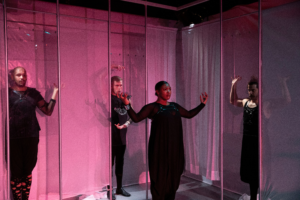
A lot of exposition is delivered through dialogue despite director/adapter Nicole Wiesner’s use of every device she can to create some visual dynamism. This includes heavily referencing Čapek having coined the modern meaning of the word “robot” in her humorous characterization of empathy-challenged medical bean counters, as well as a chorus and dance. But Čapek’s premise becomes more engaging as he shifts his attention to a typical nuclear family, making the best of the situation they can in their fickle, selfish way. The kids don’t really see why the adults think dying at forty-five is so different from dying at ninety-five and rather wish they would hurry up and clear out, which the adults naturally take offense at until the deaths of their peers open up opportunities for themselves. Michael Mejia’s portrayal of the father echoes Homer Simpson, which is representative of the show’s satirical portion when working at its best.
Taking hostages is one thing, but to pull the trigger is quite another. Galen easily steamrolls Sigelius and his sycophants, but struggles when he has to actually look wealthy patients in the eye and withhold treatment from them for failing to curtail the fearsome Marshal. Played by Marzena Bukowska, when the Marshal arrives in the flesh, it becomes evident just how naïve hope of threatening him into compliance was. He’s a maniacal demagogue and archetypical fascist, undoubtedly, but he’s also someone whose values are fundamentally at odds with Galen’s regarding what, exactly, the social utility of medicine is. “The blood of heroes is what transforms dirt into Fatherland,” he sneers; a tired old slogan but one he truly lives, or at least, really believes. Things would be easier if he was the hypocritical coward Galen anticipated, but Bukowska’s performance, which masterfully combines idealism and charisma with hubris and narcissistic self-pity, transforms the play into high tragedy.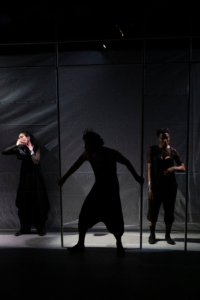
Michael Grigg’s scene design appears at first glance be a sterile medical tent, but Rachel Norwood’s lighting and Danny Rockett’s sound design make it into a quite flexible space, able to imply vast scale with just little hints. Rachel Sypniewski and Zsófia Otvos’s costumes and make-up are odd enough to allow the actors to be equally as plausible in each roll they shift through; at the end their resemblance to the ancient Greek style become apparent. Wiesner’s treatment of The White Plague is what the term “problem play” was created to describe, being something that’s hard to give a unified treatment to. But over the course of the performance, the narrowing of focus and greater allowance of emotion feels natural and welcome. Ĉapek is a literary treasure whose works American audiences rarely get to see. This adaptation is a treat; a transformation of Oedipus for the 1930s that still resonates.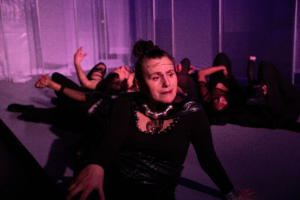
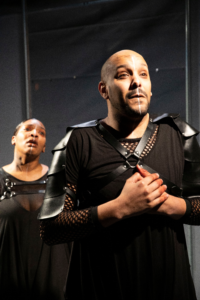 “The White Plague” will continue at Trap Door Theatre, 1655 W Cortland Ave, Chicago, thru January 11, 2020, at the following times:
“The White Plague” will continue at Trap Door Theatre, 1655 W Cortland Ave, Chicago, thru January 11, 2020, at the following times:
Thursdays: 8:00 pm
Fridays: 8:00 pm
Saturdays: 8:00 pm
There is no performance December 26, but there is one on January 8.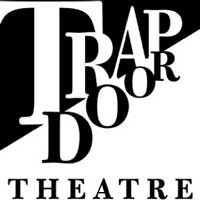
Running time is seventy-five minutes with no intermission.
Tickets are $20-25. Visit Trap Door Theatre or call 773-384-0494 or email boxofficetrapdoor@gmail.com
To see what others are saying, visit www.theatreinchicago.com, go to Review Round-Up and click at “The White Plague”.




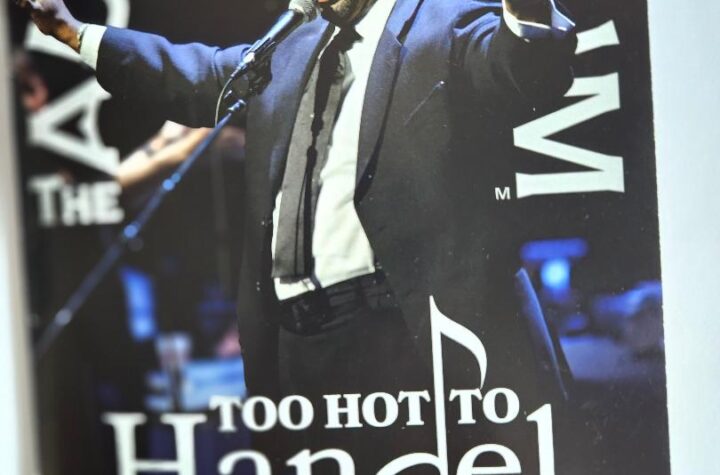
More Stories
“Jaja’s African Hair Braiding”
“Chicago , the Musical” Reviewed by Amy Menzel ( MILWAUKEE)
“shucked”